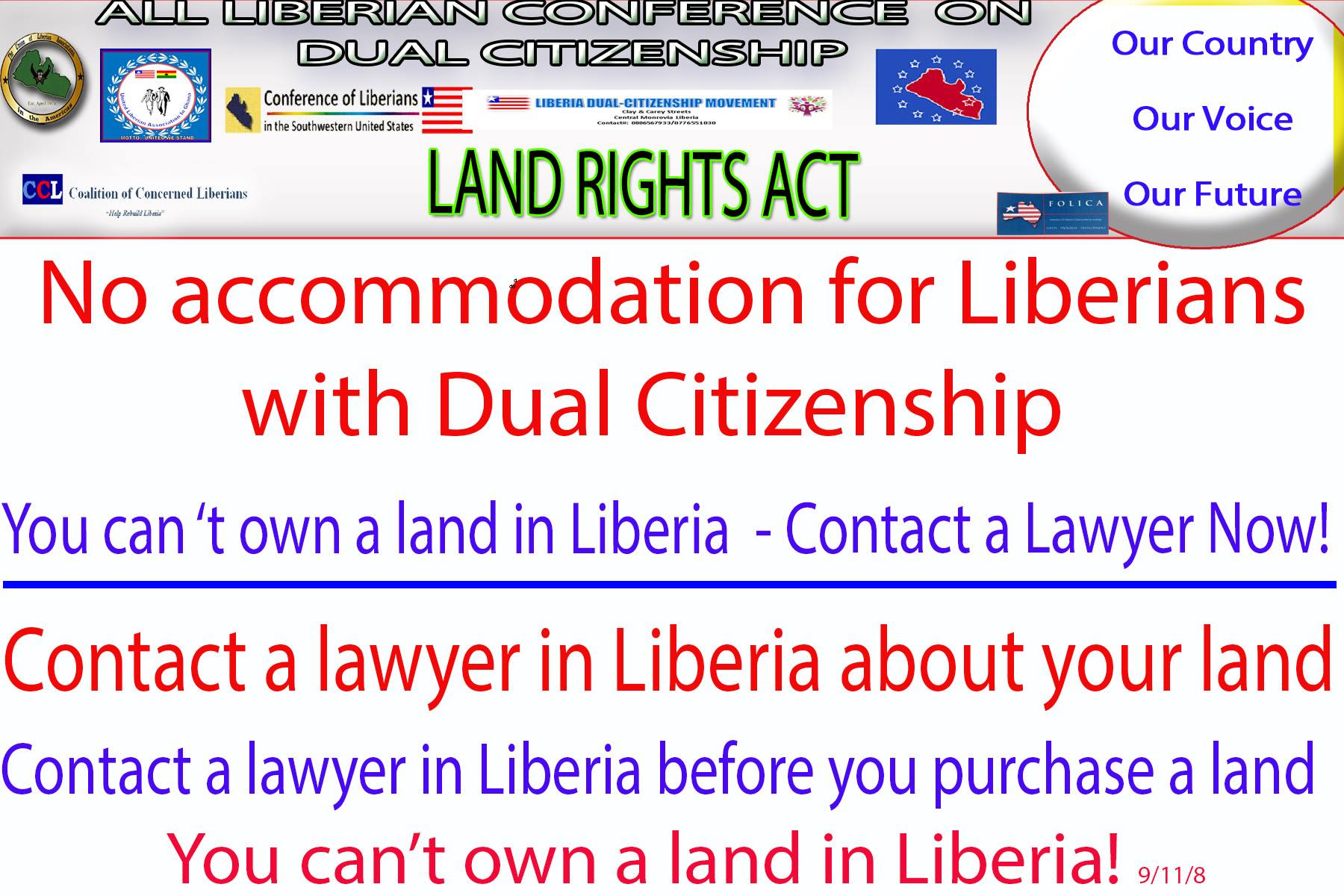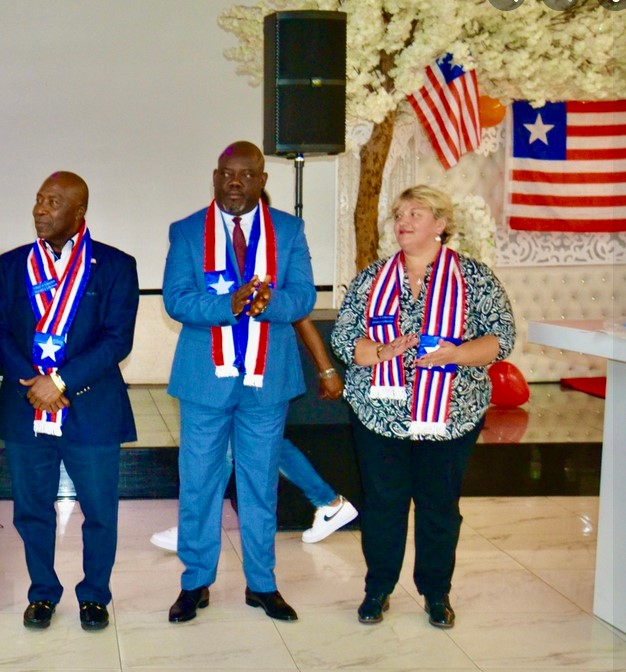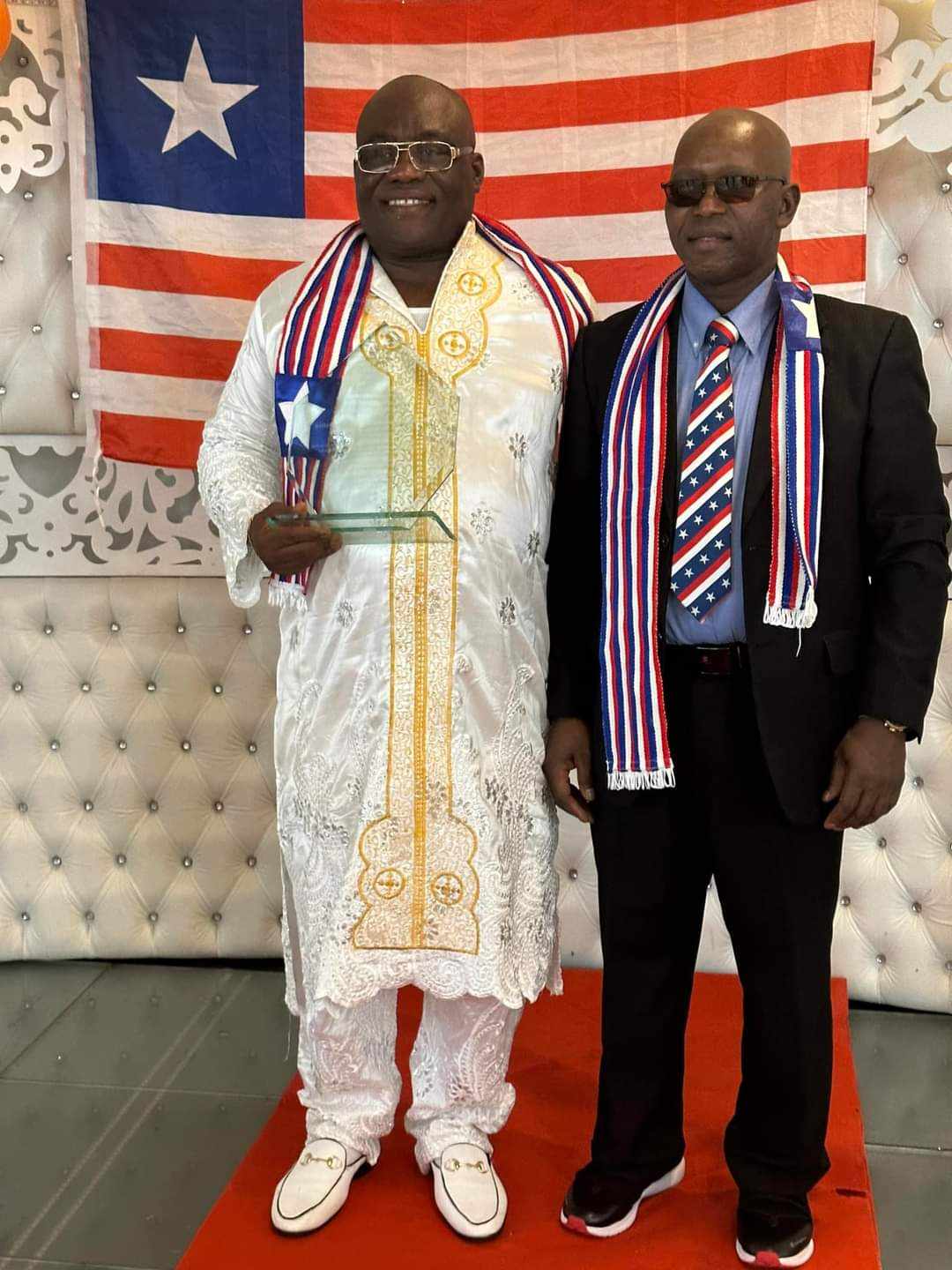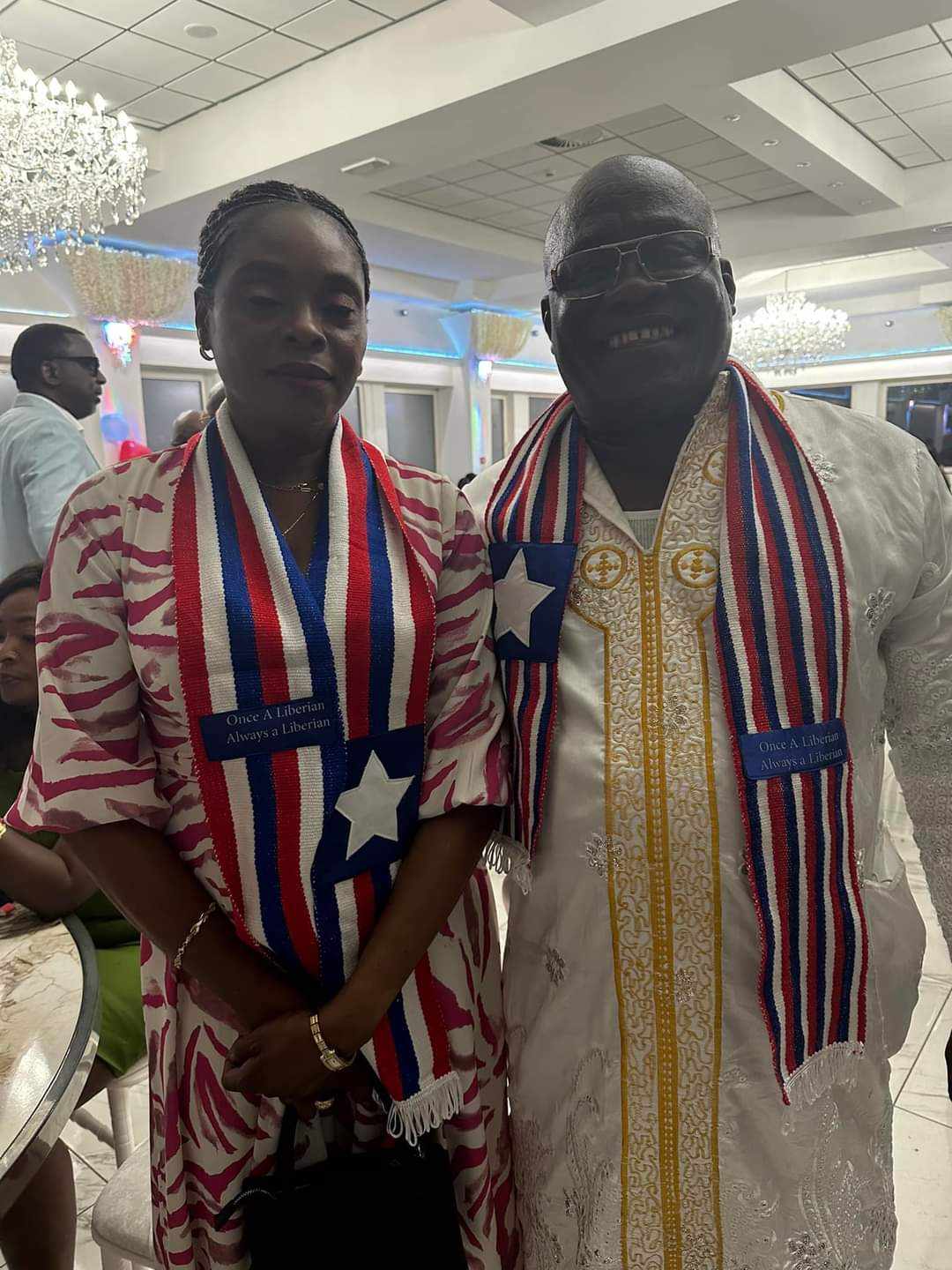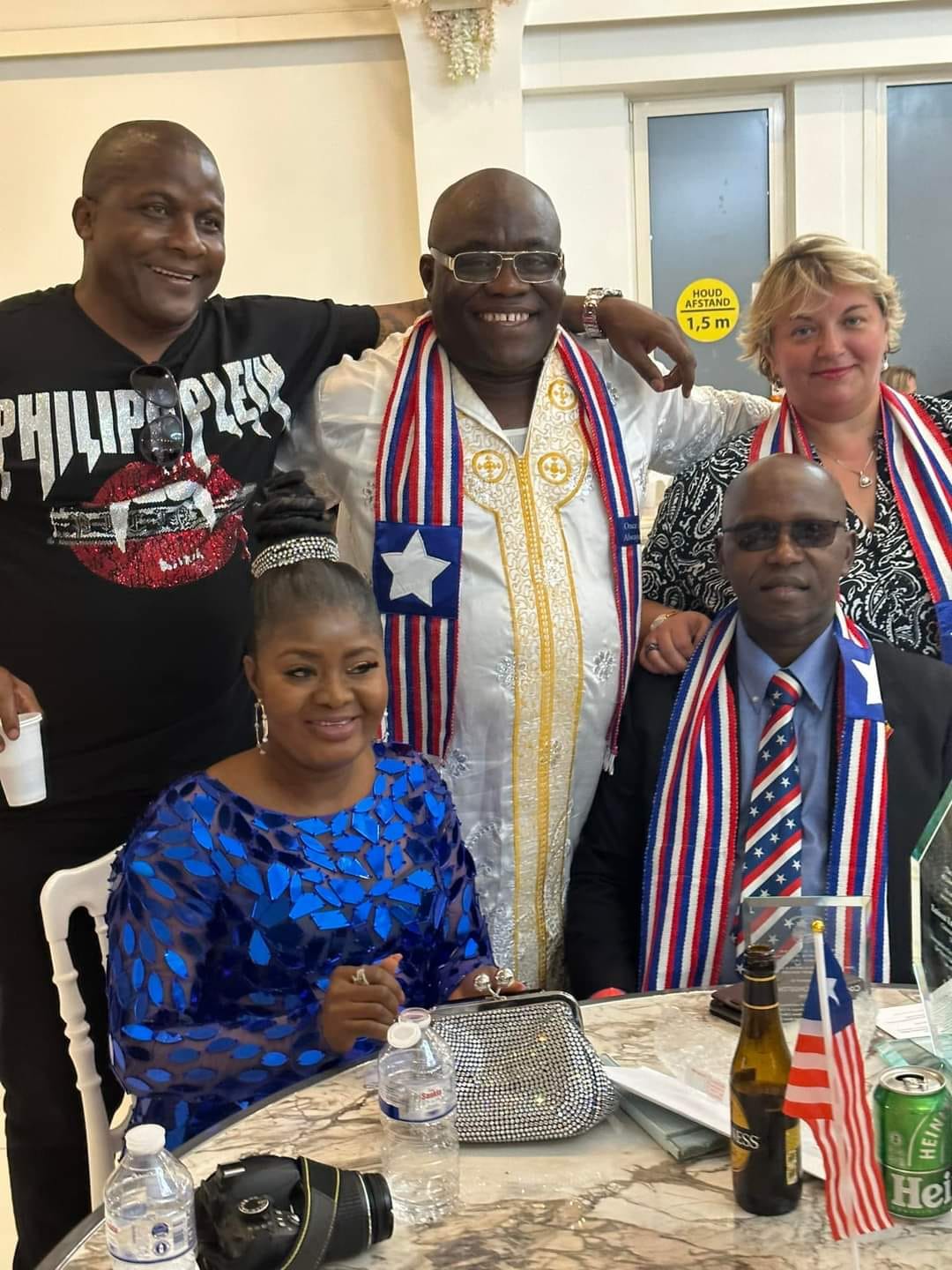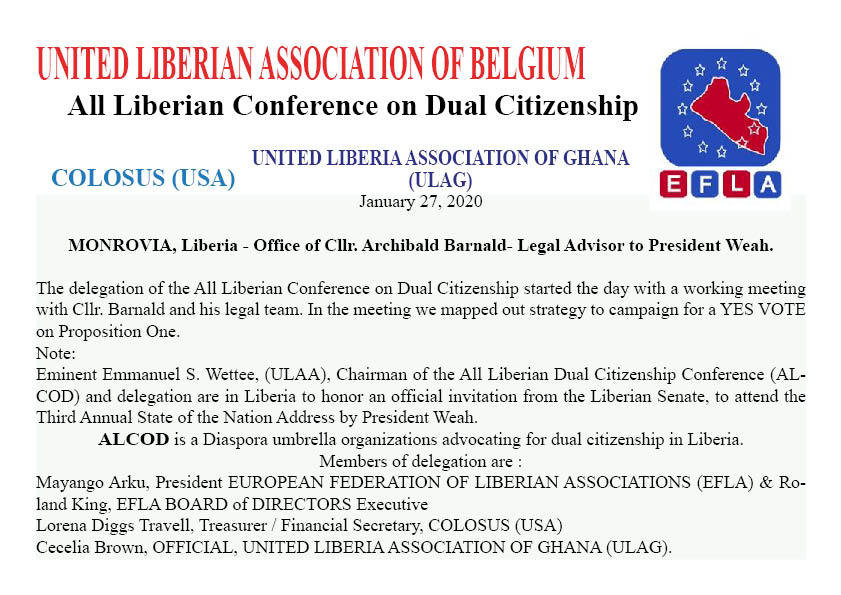DUAL CITIZENSHIP BILL


RECOGNITION FOR EFLA’s OFFICIALS FOR THE CONTRIBUTION TO ACHIEVING LIBERIA’S “DUAL CITIZENSHIP” OBJECTIVE
EVENT CANCELLED DUE TO CORONAVIRUS OUTBREAK.


EUROPEAN FEDERATION OF LIBERIAN ASSOCIATIONS
AUGUST 29th, 2019, POSITION STATEMENT, ZURICH, SWITZERLAND
Topic: Dual Citizenship for Liberians: The Beginning, the Challenges, Advantages and Way Forward to the Future
Update by: Michael Geegbae Mueller, Member of the Board of EFLA, Co- Chairman, The All Liberian Conference on Dual Citizenship
My fellow Compatriots
I am presenting to you the topic “Dual Citizenship for Liberians Living Abroad: The Beginning, the Challenges, Advantages and Way Forward to the Future”.
Liberia at 172 is a founding member of the United Nations, African Union, The Economic Community of West African States and signatory to many human rights organizations. Ambassador Angie Elizabeth Brooks-Randolph, a Liberian diplomat was the first African woman to be President of the United Nations General Assembly in the 1960s. In 1960, Liberia filed legal proceedings against South Africa at the International Court of Justice. In recent history, Liberia elected the first female President of Africa. Despite all these diplomatic achievements, the government of Liberia has from 1847 to now discriminate against its own female citizens.
According to Liberia’s 1974 Aliens and Nationality Laws at the time of birth, the rights to citizenship only descend to a child by way of their father and not their mother.
A natural born Liberian who migrated to another country and naturalized is no longer considered a Liberian and the same applies to their children. The 1974 Aliens and Nationality Laws do not support dual citizenship by allowing you to keep your Liberian citizenship and your naturalized citizenship.
And since the constitution of Liberia states that only a Liberian can own land, any land owned by a Liberian before naturalization is no longer for them after nationalization. Also, their children born outside of Liberia who are citizens of another country can’t take ownership of the land.
One of our challenges is the unwillingness of our political leaders and lawmakers who support Dual Citizenship to transfer their oral support by using their vast political influence and financial means to advocate for dual citizenship. For ten years, President Ellen Johnson Sirleaf verbally advocated for dual citizenship but failed to use her political will and enormous power and influence to impact any change in the law until she left her Presidency. President George Weah, like President Sirleaf has verbally advocated for Dual Citizenship and unlike President Sirleaf, he has gone a step further and made dual citizenship one of his legislative items. However, he has taken no action thus far.
Also, those with the means are purchasing land using Trust Funds to protect the future of their children who have different nationalities and not helping to change the law.
Looking at Countries like Ghana and Nigeria, dual citizenship will provide the legal safety net for Liberians in the diaspora with the needed skills to return home and help in the planning, development and support of building medical facilities, road networks, and universities across the country, and providing job opportunities for the people. Liberians abroad with the means can also help build and revitalize our tourism industry so Liberians can take vacations in various parts of the country to help support local businesses. Dual Citizenship will replace brain drain with brain gain. Dual Citizenship will help develop the middle class in Liberia. Dual Citizenship will enable diaspora Liberians to return home and provide identical or similar services that some Liberians seek outside of Liberia.
Before I articulate the way forward, let me provide you an update on the effort or status of our quest for dual citizenship in Liberia under the sponsorship of The All Liberian Conference on Dual Citizenship, which was established in December 2007, that is representing over 500,000 Liberians in the Diaspora and comprising of The European Federation of Liberian Associations (EFLA), the Union of Liberian Associations in the Americas (ULAA), the Federation of Liberian Communities in Australia (FOLICA), Inc., Conference of Liberian Organizations in the Southwestern United States (COLOSUS), United Liberian Association in Ghana (ULAG), and Coalition of Concerned Liberians (CCL)).
- The Supreme Court of Liberia will one day in the future make a decision on a case heard on March 2017 challenging the constitutionality of the 1974 Alien and Nationality Law. Cllr. Seward Cooper represented plaintiff Teage Jalloh.
- April 2018, Senator H. Varney G. Sherman, GRAND CAPE MOUNT COUNTY introduced a Dual Citizenship bill in the Liberian Senate.
- January 2019 President George Weah listed Dual Citizenship as a legislative item.
- August 2019, Senator Darius Dillon, MONTSERRADO COUNTY reintroduced the debate on Dual
Citizenship bill in the Liberian Senate for Liberians living abroad going clearly against Government recommendation for Constitutional amendment which will allow everyone becoming citizen.
- Our advocacy is for natural born Liberians and those born of Liberian parentage.
- Above all else, the topic of Dual Citizenship for Liberia is now a national agenda item. Therefore, one day in the future it will become a law.
The All Liberian Conference on Dual-Citizenship is planning the next conference on the 7th of December 2019 taking place in Maryland, USA where you all are invited to attend with the EFLA delegation. We all are call upon to network with our family, friends and lawmakers in Liberia in the advocacy for Dual Citizenship. Our political leaders need to be putting on record to use their political capital to make dual citizenship accepted in Liberia through law. And it needs to happen NOW!
ONCE A LIBERIAN, ALWAYS A LIBERIAN – MAY GOD BLESS MAMA LIBERIA AND ALL LIBERIANS. OUR BETTER DAYS ARE AHEAD
EFLA REPRESENTATIVES AT ALL LIBERIAN CONFERENCE ON DUAL CITIZENSHIP
Philadephia, USA
April 20, 2019
President Kingston W. WLEH Sr. and Hon. Mike MULLER at ALCDC 2019.
Aim of the Conference: enhance Liberian Diaspora capacity to DUAL CITIZENSHIP Objective. Next destination: LIBERIA.
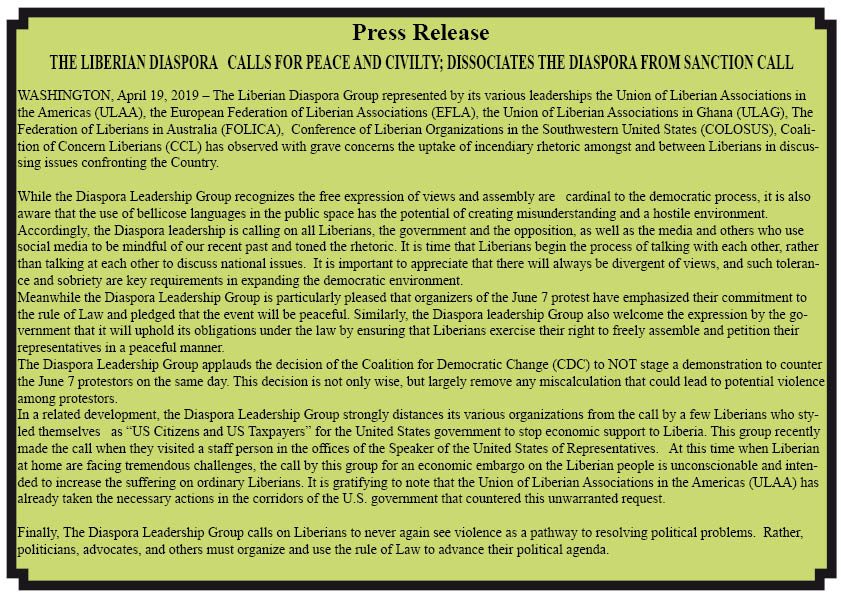
Diaspora Liberians Push for Amendment of Alien and Nationality Laws at Senate
The partners which make up the All-Liberian Conference on Dual Citizenship:
- the Liberian Citizens Committee for National Consciousness and Progress, Inc. (LCCNCP)
- the Union of Liberians Associations in the Americas (ULAA)
- the European Federation of Liberian Associations (EFLA: ULAB, LSA, LAH)
- the Conference of Liberian Associations in Southern United States (COLOSUS)
- the United Liberian Association in Ghana (ULAG)
- the Federation of Liberian Associations in Australia and the Concerned Citizens of Liberia (CCL).
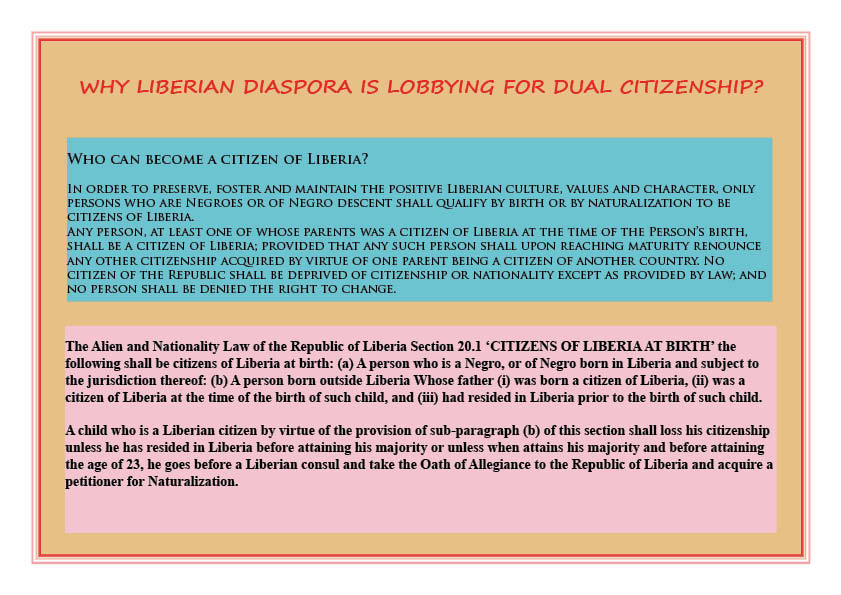
The All Liberian Conference on Dual Citizenship (ALCDC), an umbrella organization of Liberian communities in the diaspora, is calling on President George Weah and Senate Pro-Tempore Albert Chie to prevail on the Liberian Senate to pass into law an act amending the 1974 Alien and Nationality Law to allow dual citizenship in Liberia before taking their legislative break.
According to the group, since the bill was introduced at the Liberia Senate by Senators H. Varney G. Sherman (Grand Cape Mount County), Armah Zulu Jallah (Gbarpolu) and Geraldine Doe-Sheriff (Montserrado), it is yet to be passed.
Said the group, “According to the Senate rules, if Senator Albert Chie, President Pro-Tempore of the Liberian Senate, does not put the bill up for a vote and the Senate leaves for a break on August 31, 2018, the bill will not be discussed again until the Senate returns in 2019. In this light, The All-Liberian Conference on Dual Citizenship, representing over 500,000 Liberians in the Diaspora is appealing to both Senator Albert Chie, President Pro-Tempore and President George Weah to encourage the Liberian Senate to vote on the bill before their August 31st break.”
ALCDC’s appeal was contained in a statement signed by its Chairman, Emmanuel S. Wettee, and heads of several Liberian communities in the diaspora.
In the communication, the group further stated that despite the contributions of Diaspora Liberians to the country’s economy, political leaders, including lawmakers are not prepared to amend the 1974 Alien and Nationality Law to allow dual citizenship.
They are also awaiting the Supreme Court’s decision on the constitutionality of the 1974 Alien and Nationality Law, a case submitted by Cllr. Seward Cooper, representing A. Jalloh Teage as the plaintiff in March 2017.
As President Weah is preparing to address the United Nations General Assembly, the group expressed hope that the President will directly ask the Liberian Senate to take a vote on the bill and the Supreme Court to decide on the March 2017 case.
Further pushing their case for dual citizenship, the group cited a joint survey report by the World Bank and the Liberia Institute for Statistics and Geo-Information Services (LISGIS), placing Liberia among countries that receive the highest remittances in Sub-Saharan Africa.
It stated that the survey revealed that remittances to Liberia grew from US$360 million in 2011 to US$549 million in 2016, representing 27 percent of Liberia’s GDP, adding that 75 percent of remittances from abroad to Liberians came from immediate family members.
According to the group, 60 percent of transfers received were done informally, while in 2014 and 2016, about 40 percent of the total transfers received were done through traceable methods such as Western Union, Money Gram or Mobile Money.
In the statement, they also mentioned that Liberians in the United States rank first in the inflow of remittances to Liberia with the inflow of remittances from the US constituting 70 percent of the total inflow to Liberia in 2014 and 61 percent in 2016.
ALCDC: “The World Bank and LISGIS findings also noted that Diaspora Liberians in other countries provided 15 percent of inflows in 2014 and three percent in 2016.” The report, however, uncovered that in 2014, Liberia became the second top remittance-sender in the world, and during that year, Liberia remitted US$366 million, which accounted for 18.2 percent of its GDP.
“With such a report it is very difficult, if not impossible to understand why Liberians are claiming that Diaspora Liberians and to be specific those Liberians who have changed their citizenship have abandoned their country, Liberia. How have Diaspora Liberians abandoned Liberia when they are providing scholarships, healthcare, sharing knowledge and skills with their peers in Liberia and providing vast amounts of money for family and friends?” the group asked rhetorically.
Meanwhile signatories to the group’s statements include, Yamba Fofana, president of the Union of Liberian Associations in the Americas (ULAA), Kingston Washington Wleh Sr., president, European Federation of Liberian Associations (EFLA), Mohamed Salia Dukuly, president, Federation of Liberian Communities in Australia (FOLICA), Inc., Francis Williams, president, Conference of Liberian Organizations in the Southwestern United States (COLOSUS), Julia Mardea Richards, president United Liberian Association in Ghana (ULAG), John F. Lloyd, National Chairman, Coalition of Concern Liberians (CCL).
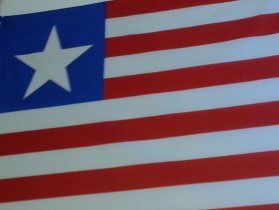
EFLA & Dual Citizenship Problematic
The info for this page is delivered by All-Liberian Conference on Dual Citizenship, headed by Hon. Emmanuel WETTEE. Mr. Michael G. MUELLER is the Co-Chairman The All Liberian Conference on Dual Citizenship

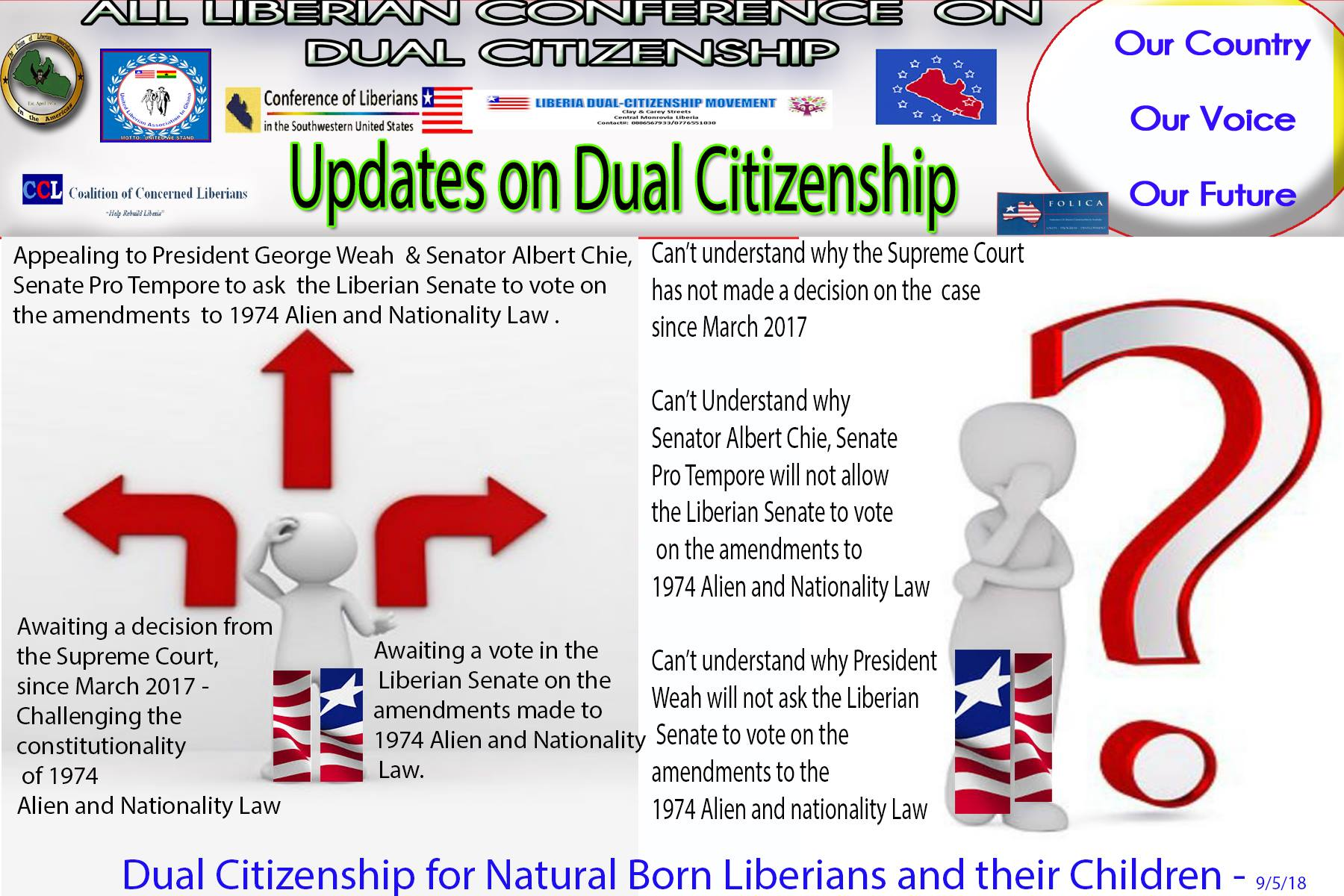
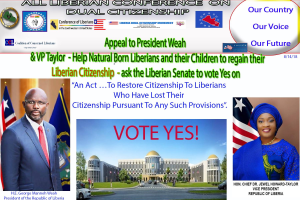
European Federation of Liberian Associations STATEMENT
July 28th 2018
Almere, The Netherlands
Dual Citizenship as a Major Component of Liberia’s Poverty Reduction, Reconciliation, and Development Agenda
By : Emily Ekua Erskine, EFLA Keynote Guest & Speaker
Excellencies, Isaac Nyenabo, Ambassador of Liberia to the Benelux, Paul Tate, Chargé of the Permanent Mission of Liberia to Switzerland and the United Nations, Mr. Nicholas Doe, President of the Liberian Association of Holland, distinguished guests, ladies and gentlemen, on behalf of the Leadership of the European Federation of Liberian Associations (EFLA), I am delighted to speak on the occasion marking the 171st Independence day celebration of the Republic of Liberia.
My special thanks go to Excellency Paul Tate for his relentless support to Liberians and for serving as an example of humanity and humility, to Mr. Mike Müeller, Vice-President of Dual Citizenship in the diaspora, for his unwavering support and advice since EFLA’s formation, and to our sister Dr. Liana Ursa, for her steadfastness, determination and very positive energy in helping the Liberian cause.
This evening, to mark our independence, we would like to focus our attention on challenges Liberians in both homeland Liberia and in the diaspora are facing, Liberian diaspora’s contributions to ease those challenges and how to cement our efforts and see Liberia lifted up once again.
Over the past decades, our people have been experiencing food insecurity, scarce or hardly direct access to water and electricity, collapsed health and education systems, unemployment, disillusion, urban demographic explosion (Monrovia), marginalization and lack of skills, only to name some.
This general climate of insecurity at different levels of our society cannot be adequately addressed if all Liberians, especially diaspora Liberians who have been involved in Liberia’s development agenda from time immemorial, are not recognized as being a part of this one big puzzle which is our country Liberia.
Diaspora Associations and Federations like EFLA were founded on the sentiment of “Love for Liberia” at a time when war was waging in Liberia. Liberians in the diaspora wanted to see Liberia lifted up, they have always strived to share responsibility in the poverty-reduction and reconciliation process.
Diaspora Liberians’ contribution is directly linked to poverty-reduction and national development. Diaspora Liberians engagement covers mainly:
- Private or personal remittances to family and friends through financial contributions and donations of different nature;
- Securing social and economic well-being of family and friends.
These remittances are estimated at USD 350 million annually, whereas our annual national budget is USD 550 million.
Homeland Liberians value the contribution of diaspora Liberians in the poverty-reduction and reconstruction process, nevertheless, in order for the impact of diaspora contribution to be greater, a major component of that one big puzzle should be recognized as such.
Liberians in the diaspora have been promoting dual citizenship as a clear guarantee of national interest and consciousness for Liberia. The request for dual citizenship is over 12 years old. That major component of that one big puzzle can only be recognized where there is unity and love. Living in the diaspora does not mean that homeland Liberians love Liberia more than diaspora Liberians.
All Liberians as well as homeland Liberians love Liberia.
Liberians in the diaspora and homeland Liberians were all born into the same family and have the same parents, ancestors/forefathers, history, names, culture, grew up in the same communities! This is an established fact and remains unquestionable and irreversible! Liberians in the diaspora’s brothers and sisters in homeland Liberia cannot deny that they do not have the same parents, ancestors, did not grow up in the same homes, do not have the same friends and relatives, do not speak the same languages, do not have the same family names, etc. Their names have not changed, their parents have not changed, their ancestors have not changed, their history has not changed, their country cannot also change.
From Liberia’s recent history, all Liberians (Liberians in the diaspora and homeland Liberians) bear indelible wounds from the 15-year old war, be they physical, psychological, emotional, which only wisdom, love and unity can mend. Recognizing dual nationality is a part of the healing process and will allow all Liberians to reunite and be considered as one big family. It is only if Liberians are united that they can make a greater difference.
Today, Liberia is celebrating 171 years of independence, and is known as Africa’s oldest Republic. Liberians are proud of belong to the oldest Republic on the continent. Dual citizenship is not only a trend in today’s Africa, but is becoming the norm. Sadly, Africa’s oldest Republic has denied herself her role as the leader of this noble cause and is still not acknowledging her importance in assuming this role.
The Liberian diaspora has made several attempts in various forms to appeal for dual citizenship and hope to see Liberia continue to lead noble causes such as dual citizenship, to reunite homeland and diaspora Liberians, to recognize the strength and power of diaspora Liberians who have been fully contributing to the development of Liberia as citizens, to see specific strategies and plans put in place in homeland Liberia. The Liberian diaspora is willing to collaborate in the establishment of operation centers abroad to facilitate the implementation of these strategic plans.
Dual nationality will support national reunification, reconciliation and national development.
Liberians in the diaspora would like to see one Liberia, void of division, representing peace, love and unity.
In union strong success is sure!
EFLA LEADERSHIP MEETING WITH H.E. GEORGE W. WEAH, President of the Republic of Liberia
Brussels, 6 June 2018

LIBERIAN DIASPORA FIGHT FOR THE LIBERIAN WOMEN RIGHTS

After producing the first African Woman President of UN General Assembly – Amb. Angie Elizabeth Brooks-Randolph,
After electing Africa first female President – President Ellen Sirleaf,
A Liberian woman does not have the legal right to pass on her Liberian citizenship to her birth child.
The amendments will make it legally possible!
LAND RIGHTS ACT – REPUBLIC OF LIBERIA
“Liberians with Dual Citizenship can’t own a land in Liberia”
